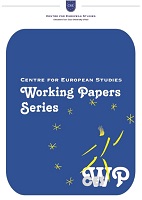THE ROLE OF ECONOMIC POLICIES FOR EXTERNAL CROSSBORDER AREAS IN SHAPING THE NEW EUROPEAN UNION
THE ROLE OF ECONOMIC POLICIES FOR EXTERNAL CROSSBORDER AREAS IN SHAPING THE NEW EUROPEAN UNION
Author(s): Marcela SlusarciucSubject(s): Economy
Published by: Editura Universităţii »Alexandru Ioan Cuza« din Iaşi
Keywords: crossborder; cooperation; enlargement; European neigbourhood
Summary/Abstract: As history proves, any enlargement of an overstate structure produces disarticulation and an increase of pressure on the borders of it. On the other side the economy produces integrative effects along the border despite of the original significance of separation that a border has. The crossborder policies of the European Union as regional player are meant to contribute to the economic structure building and enhance the stability inside and outside the Union area. Setting up the normative framework for crossborder relations is a very present-day field, being subject of study and research in all Union bodies, in the Member States governments, candidate countries or beneficiaries of the relations with the Union as well. This normative framework is meant to propel the economic increase and the raise of the daily life conditions in the neighbor countries. Alongside the border there are happening complex phenomena, some of them easy to be quantified, such as economic ones, some of them more difficult that cannot be controlled but only sociologically researched, such as cultural-identity-emotional ones. The paper aims to draw the guiding marks of the European Union external crossborder areas and the crossborder cooperation frame for Romania, to identify already visible and potential effects of the enlargement on the external borders and to make an inventory of policies that should integrate the crossborder economy.
Journal: CES Working Papers
- Issue Year: 4/2012
- Issue No: 2
- Page Range: 231-240
- Page Count: 10
- Language: English

